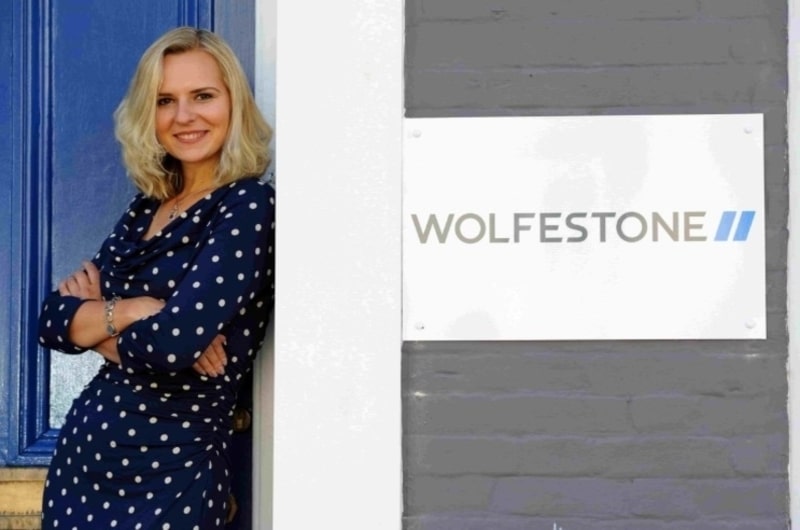
Women in Business: Interview with Anna Bastek

As we will be launching our Accelerating Women’s Careers intensive short-course soon, we thought this would be a great opportunity to interview successful women from the industry such as Anna Bastek.
She is the co-founder of Wolfestone, a triathlete and winner of ‘UK Entrepreneur of the Year’ and ‘Welsh Director of the Year’ award. Her other achievements include being an inspirational speaker and an Entrepreneurial Dynamo Role Model for the Welsh Government. Here we speak to Anna about her entrepreneurial journey so far, the challenges she faced as a woman in business and any advice she has to offer to those wanting to follow her path.
Your first business was in the translation and language sector, how important is language for international business?
Language is way more important to international business than most people think. When you think that only 25% of the world’s population speak English, if you’re not offering translated content, your business is only reaching a quarter of its potential. Three-quarters of global consumers seek out websites that are written in their own language. In fact, 72% of customers say that they would be more likely to buy a product in their own language and 56% say that the language is more important than price. Companies who have a language strategy find much more success when exporting abroad.
Have you always been entrepreneurial? What led you to taking that first step and setting up your own business?
I was born and raised in Poland, and at that time, it was still under a communist regime. I didn’t really witness or experience much entrepreneurship. I didn’t know anyone personally who ran their own business, so there wasn’t a lot of inspiration at the time. I had never given much thought to starting my own business. My main passion in life is travelling, and when I moved to the UK and got my first job, I would run out of annual leave by June every year. It was my love for travelling and needing that flexibility and freedom which fuelled my desire to become my own boss. I wanted to be in charge of my own destiny.
If any, what challenges have you experienced as a women in business during your overall career?
The main challenge I faced as a young woman from a foreign country, initially, was that most people assumed I was a translator, not the owner of the multi-award-winning translation company. They always asked me how many languages I could translate, and I would answer 200! This answer really surprised most people, because I think people I met underestimated my abilities.
What are the most important things to progressing as the owner/Director of a business? These could be characteristics, values, skills etc
It’s the ability and bravery to take risks. It isn’t a characteristic that came naturally to me, so I needed to learn to trust myself and just go for it. It’s important to understand that you will make a lot of mistakes when starting your own business, but it’s essential to be decisive and not to be afraid of making them. Running a business is always two steps forward, one step backwards – especially in the beginning.
Another very important thing for me was to trust those around me. To let go, delegate and have faith that things will get done. Maybe it won’t always be to my own standards, but progress will be made much faster. Placing your trust in staff empowers them, allows them to really think for themselves and become problem solvers. My motto is ‘Strive for progress not perfection’.
What have been some make or break moments in your career? Important client meetings, presentations, procurement pitches etc
One of the most memorable moments in my career to date, a moment were I finally realised what it was I’d achieved with Wolfestone, was getting the opportunity to meet Prince Charles. He asked me how a young woman from a foreign country had become so successful; starting a business from scratch, winning over 30 business awards and becoming the UK Entrepreneur of the Year. That was a special moment that will always stay with me.
Why is gender balance and having a more diverse workforce important, especially in senior management teams?
Women and men have entirely different decision-making processes. When under stress, men tend to take more risks, whereas women are a lot more calculated and consider all consequences, not only to themselves but to all stakeholders. Women often have a lot more collaborative approach when compared to men but men can confidently make decisions and stick by them. It’s important to have the right balance in the boardroom; to see things from different perspectives.
Tell us about your work at the Welsh Assembly Government.
My role is a Welsh Government Dynamo Role Model. It involves going to schools and universities across Wales and inspiring young people to start their own business. I know people with a limited formal education who’ve gone on to achieve amazing success and people with degrees who haven’t gone on to achieve exactly what they expected. It’s about showing pupils that entrepreneurship can be an alternative to employment if you have the right attitude and are willing to put in the work.
How do you balance being at the head of 3 different companies at the same time?
I have a managing director who runs the business on a day-to-day basis. I’m more involved in the overall strategy and vision of the companies. Looking at new potential avenues for growth, such as acquisitions and determining the general direction of each individual company.
How would you say your Executive Education courses impacted your career?
The courses definitely opened my eyes; they made me want to learn and research more. It was great to meet like-minded people and share that experience together. They always broaden one’s horizons and make you realise that there is a lot more to learn. I’m continuously learning, whether it’s from books of other successful people, podcasts, videos, etc. The learning never stops.
What one piece of advice would you give any aspiring female business leaders reading this?
Don’t be afraid to make mistakes and see them as an opportunity to learn.
Find out more about our Accelerating Women’s Careers course. The executive education programme has been introduced to educate emerging female executives who aspire to leadership roles as well as HR and diversity leaders regarding the current state of women’s advancement, awareness of gender balance in a workplace and strategies to gain leadership presence and build corporate visibility. This intensive short course taking place at GISMA Business School London aims to meet the needs of the 21st-century workforce and is aimed at creating extraordinary leaders.